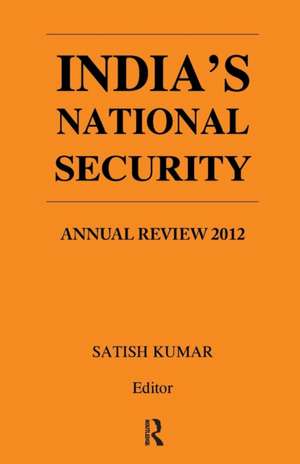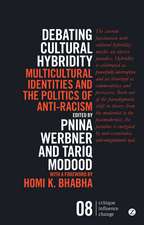India’s National Security: Annual Review 2012
Editat de Satish Kumaren Limba Engleză Paperback – 21 ian 2016
Topping the list of India’s external security concerns is China’s veiled hostility, manifest in its strategic nexus with Pakistan, incursions into India’s borders and enhanced military deployment in India’s immediate neighbourhood. Added to these are the intractable boundary dispute and uncertain implications of the recent leadership change in China. India, nevertheless, is attempting to cope with China’s pressures by engaging with it at a diplomatic level and improving its own defence capability. Pakistan remains another major threat, because of its refusal to take action against militants responsible for the 2008 Mumbai terror attacks, its efforts at expanding its nuclear arsenal, and the increasing sway of right-wing elements on its society, politics and security forces. India further faces the challenges of facilitating Nepal’s difficult transition to democracy, safeguarding its strategic interests in Afghanistan, stabilising Maldives’ fledgling democracy, and tackling ethnic insurgencies along its borders with Myanmar. On the other hand, there are positives like India’s strategic partnerships with Russia, US, France, Britain, Germany, and Japan, as well as a flowering relationship with Bangladesh.
India’s internal security situation is less alarming, with progress in talks with some North-Eastern insurgent outfits; a sharp fall in casualties due to left-wing extremism (LWE); and a gradual reduction in terrorist-related incidents in Kashmir. But sporadic cross-border infiltrations in Kashmir and spread of LWE to urban areas still pose challenges.
Addressing such and other issues, this book will be indispensable for policymakers and governmental organisations; those in defence and strategic sectors; and students of defence studies, foreign policy, international relations, and political science.
| Toate formatele și edițiile | Preț | Express |
|---|---|---|
| Paperback (3) | 268.62 lei 6-8 săpt. | |
| Taylor & Francis – 18 dec 2020 | 268.62 lei 6-8 săpt. | |
| Taylor & Francis – 21 ian 2016 | 449.41 lei 6-8 săpt. | |
| Taylor & Francis – 21 ian 2016 | 470.94 lei 6-8 săpt. | |
| Hardback (3) | 727.64 lei 6-8 săpt. | |
| Taylor & Francis – 12 iun 2012 | 727.64 lei 6-8 săpt. | |
| Taylor & Francis – 29 noi 2017 | 1007.36 lei 6-8 săpt. | |
| Taylor & Francis – 27 iun 2013 | 1171.54 lei 6-8 săpt. |
Preț: 470.94 lei
Nou
Puncte Express: 706
Preț estimativ în valută:
90.14€ • 93.75$ • 75.54£
90.14€ • 93.75$ • 75.54£
Carte tipărită la comandă
Livrare economică 14-28 martie
Preluare comenzi: 021 569.72.76
Specificații
ISBN-13: 9781138664043
ISBN-10: 1138664049
Pagini: 518
Dimensiuni: 138 x 216 x 26 mm
Greutate: 0.96 kg
Ediția:1
Editura: Taylor & Francis
Colecția Routledge India
Locul publicării:Oxford, United Kingdom
ISBN-10: 1138664049
Pagini: 518
Dimensiuni: 138 x 216 x 26 mm
Greutate: 0.96 kg
Ediția:1
Editura: Taylor & Francis
Colecția Routledge India
Locul publicării:Oxford, United Kingdom
Public țintă
PostgraduateCuprins
Governing Board. Editorial Board. Contributors. Preface. Map. Part I. National Security Review 1. An Overview 2. National Security Environment Satish Kumar (i) Global Security Trends (ii) External Security Situation (iii) Developments Pertaining to Asia, Africa and Latin America (iv) Internal Security Developments 3. India’s Neighbours (i) Bangladesh: Political Stability and Engagement with India Rajeet R. Mitter (ii) Conflict and Contradictions in Nepali Politics K. V. Rajan (iii) Maldives: Telescoping the Dynamics of Democracy Sathiyamoorthy (iv) Afghanistan: A Strategic Perspective Shakti Sinha (v) Political Process and Ethnic Groups in Myanmar Preet Malik 4. Pakistan National Security 2011 FNSR Research Staff 5. India’s Defence Initiatives 2011 FNSR Research Staff. Part II. National Security Challenges and Opportunities 6. India’s Economic Security: The Long View Chandrajit Banerjee 7. China: 18th Party Congress and Implications of Leadership Changes Jayadev Ranade 8. India’s Strategic Ties with Vietnam N. Ravi 9. The Arab Spring: Implications for India’s National Security K. P. Fabian 10. The Balance of Power in West Asia: Saudi Arabia, Iran, and Israel Prakash Shah 11. Left-Wing Extremism in India G. K. Pillai 12. Geopolitical Consequences of the Global Financial and Economic Crisis Shyam Saran Part III. Steps Towards a Stronger India 13. Science and Technology for a Stronger India Amitav Mallik 14. Manufacturing: The Imperative for India Jamshyd N. Godrej 15. Challenges of Agriculture in India T. Haque 16. Infrastructure: Towards a Stronger India Shailesh Pathak. Part IV. National Security Index 2012. Part V. Chronology of Major Events 2011. Index
Descriere
The book comprehensively analyses India’s engagement with major world powers, immediate neighbours, and countries in Africa, Latin America, West Asia, and ASEAN region, in a complex global security environment. It also scrutinises India’s response to internal and external threats, as well as measures taken for strengthening its economic security.
Notă biografică
Satish Kumar is former Professor of Diplomacy at Jawaharlal Nehru University and currently Director at the Foundation for National Security Research, New Delhi, India. As an eminent scholar in the field of International Relations, he has held several distinguished positions, including Counselor of International Relations, Academy for World Watch, Shanghai; Distinguished Fellow, Institute of Peace and Conflicts Studies, New Delhi; MEA Chair, United Service Institution of India, New Delhi; India Chair, University of World Economy and Diplomacy, Tashkent; Visiting Professor in International Relations, University of Turin, Italy; Visiting Fellow, Institute of International Studies, University of California, Berkeley; Visiting Fellow, School of Advanced International Studies, The Johns Hopkins University, Washington D.C.; and Director, Indian Foreign Service Probationers Training Course conducted by the School of International Studies, JNU. He participated in numerous international conferences and delivered special lectures at several universities and think-tanks across the world. Professor Kumar was also a columnist for the Hindustan Times (1971–78). Since 1991, he has been a member of the Indian delegation to the India–Pakistan Track II dialogue called the ‘Neemrana Initiative’. He has authored/edited over two dozen books and numerous research articles.
Recenzii
‘As in previous years, it is an invaluable compendium of analysis on matters relating to our national security.’
M. Hamid Ansari, former Vice-President of India
‘This edited collection of essays harnesses insights from national security ‘practitioners’ — defence personnel, diplomats, intelligence officers, business leaders and academics —to offer a snapshot of India’s security domain(s).’
Rina Kashyap, Head of Department of Political Science, Lady Shri Ram College, New Delhi, India (in The Financial Express)
‘This series is unique in two ways: first, this presents authoritative assessments on the complex and evolving security environment in India, indicating both challenges and opportunities and second, it serves as a channel for offering the views of experts on important security issues to the policy makers, opinion shapers and scholars.’
S. D. Pradhan, Former Deputy National Security Adviser, Government of India (in The Asian Age)
‘This publication has consistently addressed issues related to India’s national security in a comprehensive manner. My compliments to the editor and members of the editorial board for the efforts in compiling this publication’
Admiral Sunil Lanba, Chief of Naval Staff of India
‘The annual INSAR has established itself as an indispensable reference document on India's foreign and security policies for foreign affairs scholars and practitioners alike.’
Shyam Saran, Former Chairman, National Security Advisory Board, Government of India
M. Hamid Ansari, former Vice-President of India
‘This edited collection of essays harnesses insights from national security ‘practitioners’ — defence personnel, diplomats, intelligence officers, business leaders and academics —to offer a snapshot of India’s security domain(s).’
Rina Kashyap, Head of Department of Political Science, Lady Shri Ram College, New Delhi, India (in The Financial Express)
‘This series is unique in two ways: first, this presents authoritative assessments on the complex and evolving security environment in India, indicating both challenges and opportunities and second, it serves as a channel for offering the views of experts on important security issues to the policy makers, opinion shapers and scholars.’
S. D. Pradhan, Former Deputy National Security Adviser, Government of India (in The Asian Age)
‘This publication has consistently addressed issues related to India’s national security in a comprehensive manner. My compliments to the editor and members of the editorial board for the efforts in compiling this publication’
Admiral Sunil Lanba, Chief of Naval Staff of India
‘The annual INSAR has established itself as an indispensable reference document on India's foreign and security policies for foreign affairs scholars and practitioners alike.’
Shyam Saran, Former Chairman, National Security Advisory Board, Government of India






